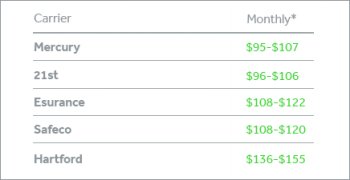
Car insurance Not on comparison
Not long ago, we conducted a survey in which 70 percent of the respondents purchased their insurance policy directly from a carrier. With financial products, people generally gravitate to familiar names, and while calling a single company like State Farm or Geico may seem like the most convenient method (it actually isn’t), failing to compare auto insurance policies could cost you thousands.
Insurance companies set their prices based on how long you’re likely to stay with them and how likely you are to file a claim, and those likelihoods are determined by certain attributes – where you live, what you drive, your driving history, occupation, and a whole lot more. All of that information is plugged into a formula, and voilá! You have your rate.
But insurers don’t all use the same method to arrive at that rate. In fact, their formulas are trade secrets, calculated by armies of actuaries parsing mountains of data. One carrier may give more consideration to your marital status or credit rating than competitors, while another might assign your ZIP code extra weight. And because the formulas differ, rates can vary widely between carriers. The best option changes from person to person, and even from year to year. The only way to know which one is right for you is to shop the market.
Technology to the rescue
Shopping the market used to mean a day on the phone with carriers, giving out the same information over and over. And over. Getting just three quotes could take hours, and even then, there’s no guarantee that the best rate of those few is actually the best rate. Being sure you made the right choice was a weekend project.
Thanks to the wonders of the Internet, it now takes just a fraction of the time. Using our comparison tool, it takes less than two minutes to get accurate estimates from up to a dozen of the nation’s largest carriers. Given that it’s so easy, we ran a test to demonstrate just how big a difference comparison shopping for auto insurance can make. See below for the results.
Comparison test 1
In our first example, our person is a 40-year-old married woman from Houston who rents her home. She drives a 2007 Honda Civic, which she owns outright. For identical coverage, the difference between the least and most expensive carriers is $41 a month. Not enough to break her budget, but over the course of a year, that adds up to nearly $500. You can buy some pretty nice things for $500.

Comparison test 2
In our second example, all of our driver’s characteristics are identical, except she now lives in Monmouth County, New Jersey, instead of Houston. As you can see, where she lives not only made a large difference in price, but also in which carrier offers the best price. (That’s one reason to ALWAYS shop for new insurance when you move, even if it’s just a ZIP code over.) The $60 gap between most and least expensive carriers would add up to an extra $720 a year.
Comparison test 3
This is where it gets really interesting. In our third example, the driver is a 20-year-old male from Nashville, Tennessee. He’s single, rents an apartment, and drives a 2011 Ford F-150, which is still being financed. If he were to call just one company based on their commercials, our driver could end up spending an extra $2, 832 a year. That’s worth repeating, so we will. $2, 832 a year.
When to compare
Rates constantly fluctuate, so it makes sense to do an auto insurance comparison every time your policy is set to renew, or about every six months. If you didn’t shop around before buying your current policy, you might not want to wait until it expires. Just don’t cancel your current policy until you have a new one in place, since that’s a great way to increase your rate.
If you’ve recently gotten married, had a baby, bought a new car, or have a child heading to college, it’s even more important to shop the market again. (For the reasons why, check out this great Huffington Post article.) Purchasing a home or just changing your address also merits a second look at your options, along with a change in occupation, promotion, or improved credit score. Even something as small as a defensive driving course can make a big difference in your premium, so check often. Or just let a Goji agent do it for you.
*Estimates based on rates provided to other customers or prospective customers with similar attributes such as vehicle, financing, home ownership. This information is provided by Goji itself and is not reported directly from any of the carriers for whom we are an authorized agent.
















